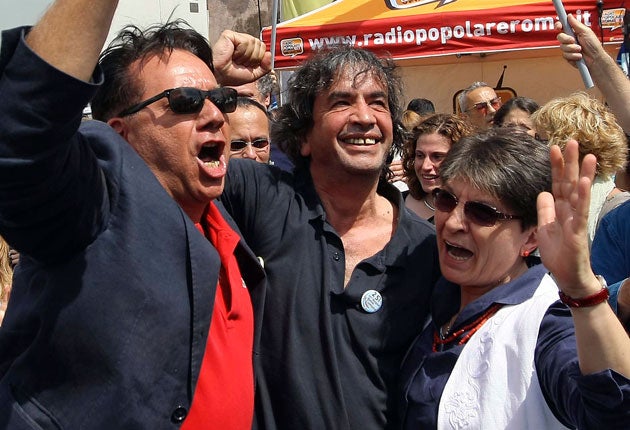Voters batter Berlusconi again in law referendums

Your support helps us to tell the story
From reproductive rights to climate change to Big Tech, The Independent is on the ground when the story is developing. Whether it's investigating the financials of Elon Musk's pro-Trump PAC or producing our latest documentary, 'The A Word', which shines a light on the American women fighting for reproductive rights, we know how important it is to parse out the facts from the messaging.
At such a critical moment in US history, we need reporters on the ground. Your donation allows us to keep sending journalists to speak to both sides of the story.
The Independent is trusted by Americans across the entire political spectrum. And unlike many other quality news outlets, we choose not to lock Americans out of our reporting and analysis with paywalls. We believe quality journalism should be available to everyone, paid for by those who can afford it.
Your support makes all the difference.Silvio Berlusconi's already battered government last night saw voters take an axe to much of the key legislation it has introduced since the 74-year-old tycoon returned to power three years ago.
Voting in four referendums, Italians decided to repeal laws on the revival of nuclear power, water privatisation and the widely criticised "legitimate impediment" rule that enables Mr Berlusconi, who is facing criminal charges in four trials, to avoid court appearances.
The latest thumbs down from the Italian electorate comes just two weeks after Prime Minister's ruling PdL (People of Freedom party) was kicked out of Naples and even his home city of Milan. Yesterday's votes showed that the Berlusconi administration is now rudderless and impotent, Professor James Walston, of the American University in Rome, said. "This is a vote on Berlusconi's popularity," Professor Walston said. "And it shows that things are unravelling faster than we expected."
Describing yesterday as "an extraordinary day", Pierluigi Bersani, leader of the centre-left Democratic Party, called on Mr Berlusconi to resign. Italians were given the chance to vote in the referendums after activists collected the half a million signatures required.
Mr Berlusconi and his supporters refused to vote in the hope of encouraging sufficient abstentions to make the process invalid. But after two days of voting, the referendums had by the closure of the polls at 3pm yesterday easily obtained the 51 per cent electorate participation that was needed. And with government supporters mostly abstaining, the votes in favour of all four referendums was over 90 per cent.
Significantly, the Interior Minister Roberto Maroni ignored Mr Berlusconi and cast his ballot. Mr Maroni is a senior figure in the Northern League, the government's junior coalition partner. Observers said the populist, anti-immigrant League fears its association with Mr Berlusconi is increasingly damaging its own standing. Senior Northern League figures regarded key losses in recent local elections in its northern heartland as evidence of this.
Yesterday's humiliation for the government could hasten the Northern League's desire to pull the plug on the Berlusconi administration. Losing the referendums was "another step towards the end of the Berlusconi government and probable early elections", Professor Walston said.
In practical terms, Mr Berlusconi will find it harder to impede trials in which he is indicted for tax fraud, bribery, sex offences and abuse of office.
And observers say it will now be very difficult to begin reviving the nuclear industry in Italy for at least another five years. The country's nuclear power plants were shut down by a 1987 referendum after the Chernobyl disaster.
The recent hikes in the price of water helped to ensure that people voted to repeal the privatisation law, although some observers said re-nationalising the service was a mistake.
Antonio Massarutto, an economics professor at Udine University, described it as "a step backwards by 20 years" for a system that desperately needed modernisation and new investment.
Experts say the Government has done little to fix the problems facing the country, which has a stagnant economy, one of the world's highest levels of public debt and 30 per cent youth unemployment.
To boost his poll standings, Mr Berlusconi is pressuring the Finance Minister Giulio Tremonti to introduce tax cuts. But Mr Tremonti, who is widely credited with shielding Italy from the worst of the financial crisis, has insisted that with a gaping black hole in its finances, the country needs to raise more money.
Join our commenting forum
Join thought-provoking conversations, follow other Independent readers and see their replies
0Comments